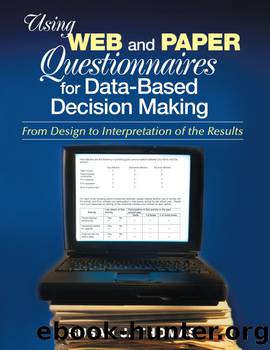Using Web and Paper Questionnaires for Data-Based Decision Making by Thomas Susan J.;

Author:Thomas, Susan J.;
Language: eng
Format: epub
ISBN: 6261422
Publisher: Corwin Press
Published: 2015-08-15T00:00:00+00:00
The sampling frame for our case study includes the parents from the three elementary schools in the district. Because the schools are small and the total population is approximately 1,500 parents, we will invite the entire population. Based on an estimated 40% response rate, weâll need 600 respondents so that we can disaggregate the data based on the demographic questions.
OBTAINING ACCESS TO MEMBERS OF YOUR TARGET AUDIENCE
If your target audience is elementary, middle, or high school students, youâll need permission from the school administration, the teachers involved, and perhaps the districtâs research unit or Institutional Research Review Board. In these situations, and many similar ones, youâll need a gatekeeper letter to request permission to obtain access to members of your target audience. Gatekeepers include people who do not respond to your questionnaire, but who must give permission for you to contact members of your target audience. Gatekeepers include parents, school administrators, and teachers. If your target audience is students, itâs also important to obtain parental consent for their childâs participation.
Letâs look at how to write letters to these people, whom weâll call âgatekeepers.â
Why Do You Need a Gatekeeper Letter for Parents?
The newly revised Elementary and Secondary Education Act signed into law in January 2002 requires school districts to formulate policies for notifying parents and for protecting familiesâ privacy when students are asked to respond to questionnaires that contain questions about their sexual activities, political beliefs, religious practices, drug use, and a variety of other sensitive topics. Why might questionnaires be used to collect data on these topics? Schools are the best place to get an understanding of whatâs going on in the lives of adolescents. Even if your questionnaire does not contain sensitive questions, itâs still a good idea to request permission of parents for their child to respond to your questionnaire.
Parents need to provide informed consent before their child can participate in a study. Potential adult respondents also need to provide informed consent. Guidelines for participation in a study such as a survey project have been published by the American Educational Research Association (AERA; 2000) and the American Psychological Association (APA; 2003). In addition, the Buckley Amendment, or the Family Education Rights and Privacy Act of 1974, protects an individualâs records, such as those maintained by a school district. It states that records maintained for one purpose (such as grades, kept for the purpose of recording student performance) cannot be used for another purpose (such as a research study) without the consent of the student and, in the case of minors, of their parents.
Informed consent involves providing details about the study to the prospective participant, including the purpose of the study, how the study will be conducted, a description of any risks and benefits, an offer to answer questions about the study, and assurance that the person may withdraw from the study (not complete the questionnaire) at any time.
There are two ways of obtaining informed consent from parents for their child to respond to a questionnaire. One is active permission and the second is passive permission.
Download
This site does not store any files on its server. We only index and link to content provided by other sites. Please contact the content providers to delete copyright contents if any and email us, we'll remove relevant links or contents immediately.
The Art of Coaching Workbook by Elena Aguilar(50161)
Trainspotting by Irvine Welsh(21070)
Twilight of the Idols With the Antichrist and Ecce Homo by Friedrich Nietzsche(18316)
The Secret History by Donna Tartt(18261)
All the Missing Girls by Megan Miranda(14842)
Cat's cradle by Kurt Vonnegut(14803)
Ready Player One by Cline Ernest(14060)
Talking to Strangers by Malcolm Gladwell(12912)
Fangirl by Rainbow Rowell(8812)
The Compound Effect by Darren Hardy(8541)
Thirteen Reasons Why by Jay Asher(8488)
The remains of the day by Kazuo Ishiguro(8427)
Periodization Training for Sports by Tudor Bompa(7939)
Tools of Titans by Timothy Ferriss(7848)
Wonder by R. J. Palacio(7755)
The Lover by Duras Marguerite(7603)
Change Your Questions, Change Your Life by Marilee Adams(7399)
A Court of Wings and Ruin by Sarah J. Maas(7303)
The Complete Stick Figure Physics Tutorials by Allen Sarah(7162)
